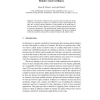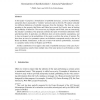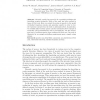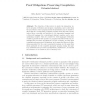100
click to vote
IFIP
2005
Springer
15 years 7 months ago
2005
Springer
Abstract. Trust Management is an approach to construct and interpret the trust relationships among public-keys that are used to mediate security-critical actions. Cryptographic cre...
103
click to vote
IFIP
2005
Springer
15 years 7 months ago
2005
Springer
In this paper, as a step towards the ultimate aim of developing an evoting system that would be likely to gain and retain the trust of the general voting public, we describe a des...
103
Voted
IFIP
2005
Springer
15 years 7 months ago
2005
Springer
Anonymity with identity escrow attempts to allow users of a service to remain anonymous, while providing the possibility that the service owner can break the anonymity in exception...
96
Voted
IFIP
2005
Springer
15 years 7 months ago
2005
Springer
We present a method for trust scenarios with more than one trustee, where sets of trustees are ordered in a relation of relative trustworthiness. We show how a priority structure i...
117
Voted
IFIP
2005
Springer
15 years 7 months ago
2005
Springer
This paper considers the effect of untyped attackers inside a distributed system where security is enforced by the type system. In previous work we introduced the Key-Based Decentr...
IFIP
2005
Springer
15 years 7 months ago
2005
Springer
In this paper we propose a formalization of probable innocence, a notion of probabilistic anonymity that is associated to “realistic” protocols such as Crowds. We analyze crit...
97
Voted
IFIP
2005
Springer
15 years 7 months ago
2005
Springer
Recently, opacity has proved to be a promising technique for describing security properties. Much of the work has been couched in terms of Petri nets. Here, we extend the notion of...





